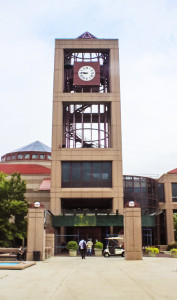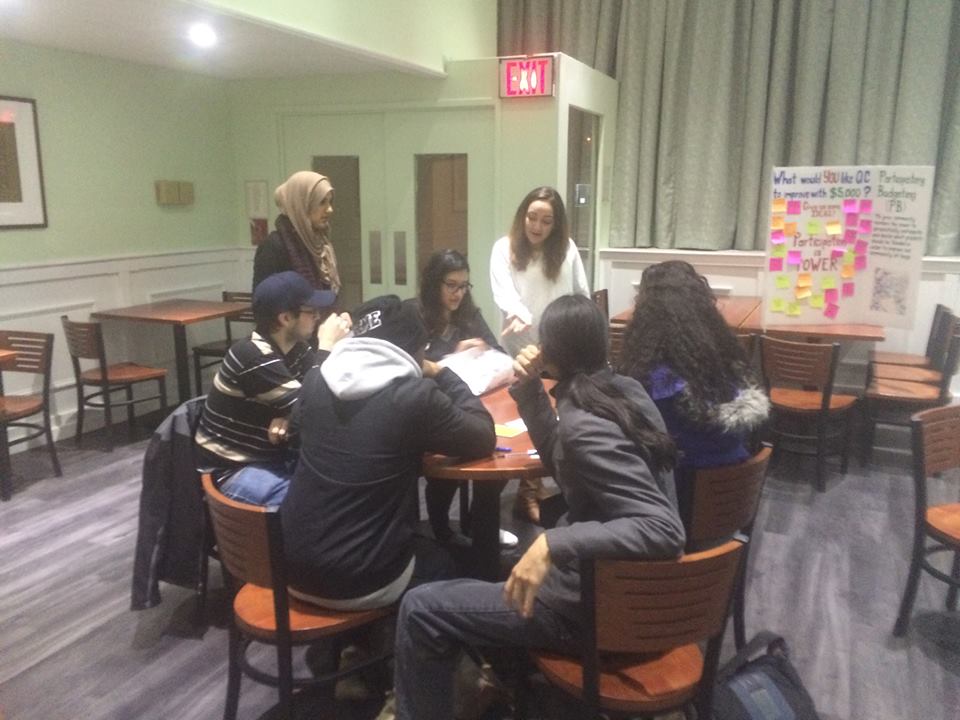
Chaney-Goodman-Schwerner Clock Tower – named after the three civil rights workers killed during Freedom Summer
Fifty years ago, QC graduate, Mark Levy was in Mississippi participating in various civil rights projects. He and his wife Betty, also a QC graduate, taught at Freedom Schools, alternative schools mostly found in the South for black students, and worked on voter registration projects. They were among thousands of activists, many of them QC students, who went to Mississippi for Freedom Summer in 1964.
Events that summer spearheaded major victories against discrimination and injustice, victories that were won through the communication and organizational efforts of local, ordinary people. Considering current events that challenge the successes of the 1960s, Levy emphasized the importance of ordinary people learning from the past and returning to a form of grassroots activism.
“Ordinary people have the ability and skills to organize social movements,” Levy said. “They need to be reminded that yes, they can and yes, they should do these things.”
Over the summer, Levy spoke to student Percy Ellis Sutton SEEK Program. He reflected on his work during Freedom Summer, sharing that fundamentally it was about “nitty-gritty organizing: walking dusty roads, door knocking, teaching in freedom schools, visiting churches on Sundays, introducing people to other people so they could work together, building relationships, and earning trust.”
As a product of a major historical event that functioned without the internet, Levy thinks there are limitations to social media activism. According to him, it’s not the same as getting together and developing direct, close relationships with other people; liking a post on Facebook or checking an email can’t necessarily accomplish that.
He also believes that the social institutions such as churches and schools, that were helpful during Freedom Summer, lost their power to help social movements.
Despite setbacks, Levy is optimistic about the future. He referred the SEEK commemoration over the summe and the QC division of NYPIRG as hopeful indicators that youth will organize and continue the movement to “make this a better world.”
“You need to protect what has been won. And for new issues, you have to help win new struggles to pass on new rights and benefits to those coming behind you,” Levy said.
And there are roles for everyone, Levy assures. When discussing Freedom Summer, he points out that there was no charismatic leader. Instead, everyone contributed their individual strengths and skills. Writers, visual artists, musicians and others with a multitude of skill sets can aid in the movement.
In remembering James Chaney, Andrew Goodman, and Michael Schwerner, activists who were murdered while in Mississippi, Levy urges to focus on and honor the work they’ve done.
“It’s not about them or their murders,” he said. “It’s about what they were working for and fighting for. They were ordinary young people. Not martyrs.”
Many organizations work to continue their legacy, including The Andrew Goodman Foundation, created by Goodman’s parents in 1966 and now run by his brother, David. Goodman was a QC student before he was murdered. The mission of the foundation is to “empower the next generation to initiate and sustain creative and effective social action; we enable leaders and their communities to flourish by operating and investing in programs that advance civic engagement and intergenerational coalitions,” according to their website.
Supporting Levy’s idea that there is a role for everyone in the movement, the foundation’s vision is that “every person will take action to create a peaceful, just, and sustainable world.”
The 50th anniversary of Freedom Summer has been a reminder that there is still much to be done. Events across the country serve to remember those of the past and inspire a new movement or a renaissance of citizen participation in democracy, as David Goodman states.
QC takes part in the anniversary with its Freedom Summer exhibit in Rosenthal Library, which opened on June 30. It showcases original material from the department of Special Collections and Archives, which houses the Civil Rights Archives. The exhibit will run until October.
As a veteran of Freedom Summer and participant in commemorative events, Levy cautions people to not be complacent.
“We need to remember that it was a ‘freedom movement’ – a movement a lot broader than for just civil rights. Most importantly, we need to know that the struggle is not over,” Levy said.














